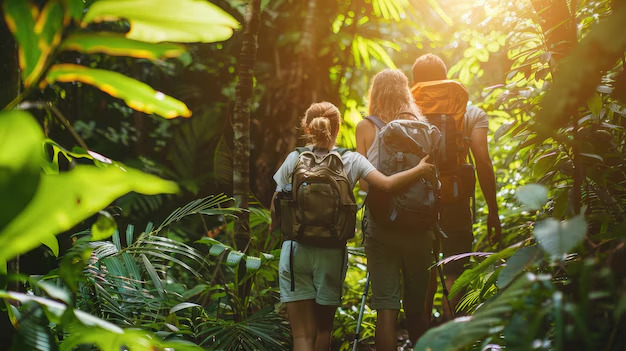As travelers become more conscious of their impact on the environment, the demand for sustainable travel experiences is on the rise. From eco-lodges and carbon-neutral adventures to responsible wildlife tourism and green city breaks, there are countless ways to explore the world while preserving its beauty for future generations. In this guide, we highlight the top eco-friendly travel experiences this year, offering inspiration for those who wish to travel responsibly without compromising on adventure or comfort.
1. Stay in Eco-Friendly Accommodations
Sustainable lodging options have flourished in recent years, offering everything from luxury eco-resorts to off-the-grid retreats. Many of these accommodations integrate renewable energy, water conservation systems, and locally sourced materials while promoting community-based tourism. Some top choices this year include:
Lapa Rios, Costa Rica
Nestled in the biodiverse Osa Peninsula, this award-winning eco-lodge is a haven for nature lovers. Built with sustainability at its core, Lapa Rios offers solar-powered accommodations, rainwater harvesting systems, and immersive wildlife experiences guided by conservationists.
Whitepod Eco-Luxury Hotel, Switzerland
For those who love mountain retreats, Whitepod’s geodesic domes provide a stunning alpine escape. The resort operates with minimal energy consumption and offers nature-based activities like hiking, skiing, and wildlife observation.
Song Saa Private Island, Cambodia
This luxury island resort is a model of sustainable tourism, with a focus on marine conservation and community development. Guests can participate in reef restoration efforts while enjoying breathtaking seascapes and organic farm-to-table dining.
2. Explore Carbon-Neutral Destinations
Some destinations have taken remarkable strides in reducing their carbon footprint and promoting green initiatives. Cities and regions prioritizing sustainable development allow travelers to enjoy guilt-free exploration.
Copenhagen, Denmark
Recognized as one of the world’s greenest cities, Copenhagen offers extensive cycling infrastructure, energy-efficient hotels, and a growing number of organic restaurants. The city aims to be carbon-neutral by 2025, making it a great model for responsible urban travel.
Bhutan: The Carbon-Negative Kingdom
Bhutan is not just carbon-neutral but carbon-negative, meaning it absorbs more CO2 than it emits. Travelers can experience stunning monasteries, pristine forests, and sustainable cultural practices while supporting the country’s commitment to environmental conservation.
Vancouver, Canada
This West Coast gem is leading the way in green city living with extensive public transport, eco-conscious restaurants, and sustainable tourism programs. Vancouver’s proximity to nature also makes it an excellent destination for eco-adventurers.
3. Responsible Wildlife Experiences
Wildlife tourism can be ethical and impactful when done responsibly. Instead of zoos or exploitative attractions, opt for experiences that focus on conservation and animal welfare.
Gorilla Trekking in Rwanda
A bucket-list experience for many, gorilla trekking in Rwanda is carefully managed to protect the primates and their habitat. Conservation fees contribute to community development and ongoing efforts to preserve the endangered mountain gorilla population.
Elephant Conservation in Thailand
Instead of riding elephants, support ethical sanctuaries like Elephant Nature Park in Chiang Mai. These organizations rescue and rehabilitate elephants, allowing visitors to observe and interact with them in a respectful and sustainable manner.
Sea Turtle Conservation in Mexico
Many coastal regions in Mexico, such as the Riviera Maya, offer programs where visitors can help release baby sea turtles into the ocean. These efforts aid in turtle conservation while providing travelers with a heartwarming and memorable experience.
4. Sustainable Adventure Travel
For those who seek adrenaline-pumping experiences without harming the planet, several adventure tourism operators focus on sustainability.
Eco-Trekking in Nepal
The Annapurna and Everest trekking routes now have eco-lodges that minimize environmental impact and support local communities. Travelers are encouraged to reduce plastic waste and follow responsible trekking practices.
Kayaking in New Zealand’s Abel Tasman National Park
Abel Tasman National Park offers some of the best eco-friendly kayaking experiences. Paddling through crystal-clear waters while spotting seals and native birds is a great way to experience New Zealand’s natural beauty sustainably.
Cycling the Netherlands
With an extensive network of cycling paths, the Netherlands offers an eco-friendly way to explore picturesque landscapes, historic cities, and windmills while reducing carbon emissions.
5. Green Culinary Experiences
Food is an essential part of travel, and seeking out farm-to-table dining, zero-waste restaurants, and plant-based cuisine can help reduce your environmental impact.
Farm-to-Table Dining in Italy
Regions like Tuscany and Sicily are known for their slow food movement, emphasizing locally grown, organic produce. Visitors can dine at agriturismos (farm stays) and participate in traditional cooking classes.
Zero-Waste Restaurants in London
London’s growing eco-conscious dining scene includes restaurants like Silo, which eliminates food waste by using a closed-loop system, composting leftovers, and sourcing sustainably.
Plant-Based Culinary Tours in Bali
Bali’s wellness-focused travel scene includes plenty of plant-based eateries and sustainable food experiences. Visitors can join vegan food tours and learn about traditional Indonesian plant-based cuisine.
6. Eco-Conscious Transportation
Choosing sustainable transportation options is one of the most effective ways to lower your travel carbon footprint.
Train Travel Across Europe
Instead of flying, opt for high-speed trains that connect major European cities. The Eurostar, for instance, offers a carbon-efficient way to travel between London, Paris, and Amsterdam.
Electric Car Road Trips in Norway
Norway is a leader in electric vehicle adoption, making it an ideal destination for a scenic road trip with minimal emissions. Charging stations are abundant, making it easy to explore the fjords in an eco-friendly way.
Sailing the Greek Islands
Rather than taking large cruise ships, opt for wind-powered sailing tours that minimize environmental impact while providing an intimate and authentic experience of the Greek Isles.
Conclusion
Sustainable travel is more than just a trend—it’s a commitment to preserving the world’s natural and cultural heritage while exploring it responsibly. Whether it’s staying in eco-friendly accommodations, engaging in responsible wildlife tourism, or choosing green transportation, there are endless ways to travel with the planet in mind. This year, make your escapes sustainable, ensuring that the places you visit remain pristine and vibrant for generations to come.



